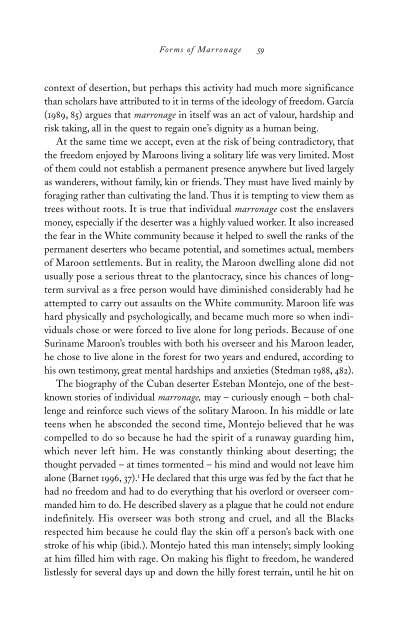60199616-flight-to-freedom-african-runaways-and-maroons-in-the-americas
60199616-flight-to-freedom-african-runaways-and-maroons-in-the-americas
60199616-flight-to-freedom-african-runaways-and-maroons-in-the-americas
Create successful ePaper yourself
Turn your PDF publications into a flip-book with our unique Google optimized e-Paper software.
Forms of Marronage<br />
59<br />
context of desertion, but perhaps this activity had much more significance<br />
than scholars have attributed <strong>to</strong> it <strong>in</strong> terms of <strong>the</strong> ideology of <strong>freedom</strong>. García<br />
(1989, 85) argues that marronage <strong>in</strong> itself was an act of valour, hardship <strong>and</strong><br />
risk tak<strong>in</strong>g, all <strong>in</strong> <strong>the</strong> quest <strong>to</strong> rega<strong>in</strong> one’s dignity as a human be<strong>in</strong>g.<br />
At <strong>the</strong> same time we accept, even at <strong>the</strong> risk of be<strong>in</strong>g contradic<strong>to</strong>ry, that<br />
<strong>the</strong> <strong>freedom</strong> enjoyed by Maroons liv<strong>in</strong>g a solitary life was very limited. Most<br />
of <strong>the</strong>m could not establish a permanent presence anywhere but lived largely<br />
as w<strong>and</strong>erers, without family, k<strong>in</strong> or friends. They must have lived ma<strong>in</strong>ly by<br />
forag<strong>in</strong>g ra<strong>the</strong>r than cultivat<strong>in</strong>g <strong>the</strong> l<strong>and</strong>. Thus it is tempt<strong>in</strong>g <strong>to</strong> view <strong>the</strong>m as<br />
trees without roots. It is true that <strong>in</strong>dividual marronage cost <strong>the</strong> enslavers<br />
money, especially if <strong>the</strong> deserter was a highly valued worker. It also <strong>in</strong>creased<br />
<strong>the</strong> fear <strong>in</strong> <strong>the</strong> White community because it helped <strong>to</strong> swell <strong>the</strong> ranks of <strong>the</strong><br />
permanent deserters who became potential, <strong>and</strong> sometimes actual, members<br />
of Maroon settlements. But <strong>in</strong> reality, <strong>the</strong> Maroon dwell<strong>in</strong>g alone did not<br />
usually pose a serious threat <strong>to</strong> <strong>the</strong> plan<strong>to</strong>cracy, s<strong>in</strong>ce his chances of longterm<br />
survival as a free person would have dim<strong>in</strong>ished considerably had he<br />
attempted <strong>to</strong> carry out assaults on <strong>the</strong> White community. Maroon life was<br />
hard physically <strong>and</strong> psychologically, <strong>and</strong> became much more so when <strong>in</strong>dividuals<br />
chose or were forced <strong>to</strong> live alone for long periods. Because of one<br />
Sur<strong>in</strong>ame Maroon’s troubles with both his overseer <strong>and</strong> his Maroon leader,<br />
he chose <strong>to</strong> live alone <strong>in</strong> <strong>the</strong> forest for two years <strong>and</strong> endured, accord<strong>in</strong>g <strong>to</strong><br />
his own testimony, great mental hardships <strong>and</strong> anxieties (Stedman 1988, 482).<br />
The biography of <strong>the</strong> Cuban deserter Esteban Montejo, one of <strong>the</strong> bestknown<br />
s<strong>to</strong>ries of <strong>in</strong>dividual marronage, may – curiously enough – both challenge<br />
<strong>and</strong> re<strong>in</strong>force such views of <strong>the</strong> solitary Maroon. In his middle or late<br />
teens when he absconded <strong>the</strong> second time, Montejo believed that he was<br />
compelled <strong>to</strong> do so because he had <strong>the</strong> spirit of a runaway guard<strong>in</strong>g him,<br />
which never left him. He was constantly th<strong>in</strong>k<strong>in</strong>g about desert<strong>in</strong>g; <strong>the</strong><br />
thought pervaded – at times <strong>to</strong>rmented – his m<strong>in</strong>d <strong>and</strong> would not leave him<br />
alone (Barnet 1996, 37). 1 He declared that this urge was fed by <strong>the</strong> fact that he<br />
had no <strong>freedom</strong> <strong>and</strong> had <strong>to</strong> do everyth<strong>in</strong>g that his overlord or overseer comm<strong>and</strong>ed<br />
him <strong>to</strong> do. He described slavery as a plague that he could not endure<br />
<strong>in</strong>def<strong>in</strong>itely. His overseer was both strong <strong>and</strong> cruel, <strong>and</strong> all <strong>the</strong> Blacks<br />
respected him because he could flay <strong>the</strong> sk<strong>in</strong> off a person’s back with one<br />
stroke of his whip (ibid.). Montejo hated this man <strong>in</strong>tensely; simply look<strong>in</strong>g<br />
at him filled him with rage. On mak<strong>in</strong>g his <strong>flight</strong> <strong>to</strong> <strong>freedom</strong>, he w<strong>and</strong>ered<br />
listlessly for several days up <strong>and</strong> down <strong>the</strong> hilly forest terra<strong>in</strong>, until he hit on


